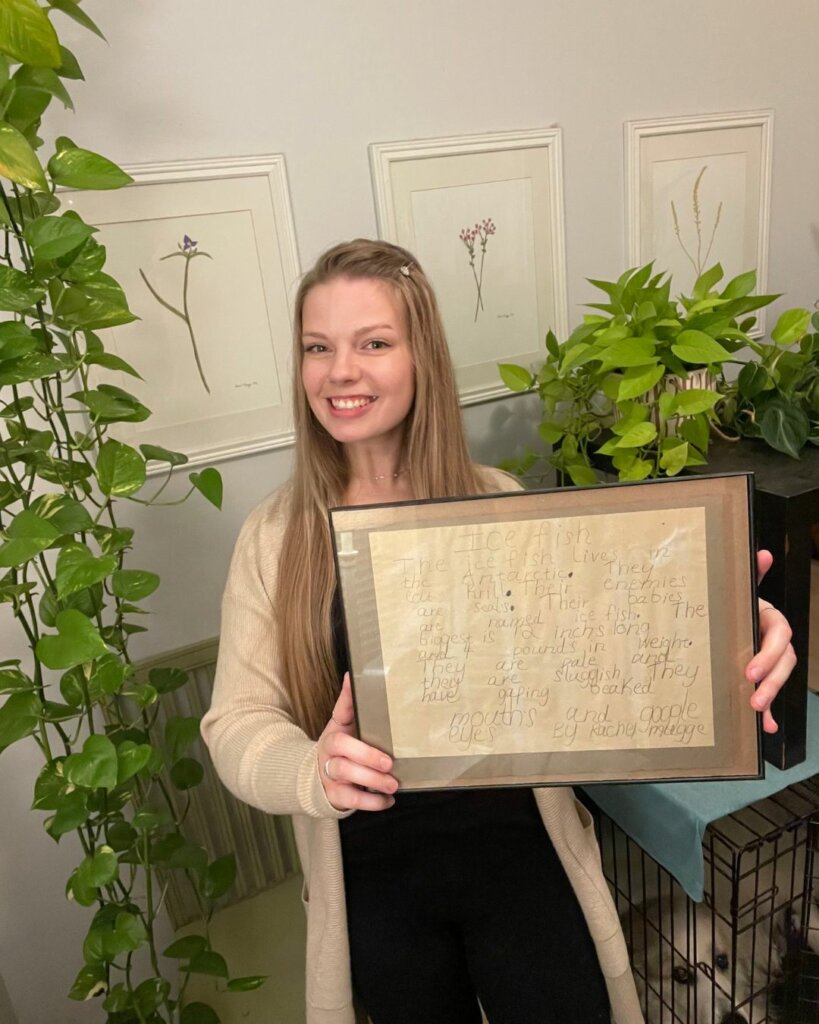Finding Her Calling at Sea

2012 graduate loves explaining science and why it’s important.
On one of the walls in her office at the U.S. Naval Research Laboratory, Rachel Mugge (WC ’12) keeps a visual reminder of how she ended up in Ocean Springs, Miss.
It’s a framed copy of a project she did in first grade on ice fish in the Antarctic Ocean.
“I don’t remember what the project was exactly, but my teacher had us research something we were interested in,” she said. “That project was the first time I realized how deep the ocean is and that things live and thrive down where it’s dark and cold.”
What started as a research project has become a life’s work for Mugge, a marine microbial ecologist. As a civilian research scientist for the Navy, Mugge’s studies have taken her offshore to observe how communities of bacteria interact with the metal surfaces of shipwrecks.
Most of Mugge’s work has been focused on Anona, a steam yacht that sank in the Gulf of Mexico in 1944. Built in 1904, Anona was a luxury yacht purchased by a wealthy industrialist. However, according to marine archaeologist Melanie Damour, “the former grand dame of the seas was reduced to hauling a cargo of potatoes to the West Indies when her steel hull plates suddenly buckled, causing her to sink.”
Anona’s nine-person crew all survived after being rescued at sea two days later.
The backstory of Anona, one of over 2,000 shipwrecks in the Gulf of Mexico, may never be made into a major motion picture. Yet, Mugge recalled the excitement of seeing the vessel in its aquatic graveyard 1,200 meters beneath the surface. She remembers how she stared in awe as the remotely operated vehicles (ROV) began beaming back images.
“It was just this beautiful structure that’s been almost preserved in time by the deep ocean,” she said. “As soon as these structures are submerged underwater, they’re colonized by microbes, and these microbes form this amazing biofilm on the surface.
“Eventually you have an artificial reef with fish and sharks swimming around it. It gives me chills just thinking about it; they’re so beautiful.”
After graduating with a bachelor’s degree in biology from Oral Roberts University in 2016, Mugge pursued both a master’s degree and a doctorate in coastal sciences from the University of Southern Mississippi. In 2024, she was named Graduate Assistant of the Year for her work studying the microbiome of biofilms and sediments adjacent to historic shipwrecks and artificial reefs.
As part of her graduate research with USM, Mugge focused on the microbes that exist around sunken metal structures and how they accelerate the corrosion of those “man-made reefs.”
During her time in Ocean Springs, Mugge has racked up over 20 research cruises and spent more than 100 days at sea.
“It’s the best thing ever,” Mugge said of the research cruises. “It’s probably my favorite part of the job. (I love) just being out on the water and getting to do science out there. It’s gorgeous.
“I like to call that part of my job the shiny science. People hear the word ‘shipwreck,’ and they’re like, ‘Oh my gosh, that’s so cool.’ For me, the cool part is what is beside the shipwrecks, the microbes living in those environments.”
Mugge’s second favorite part of the job is sharing what she knows with other people. In 2022, her Defense Advanced Research Projects Agency (DARPA) program manager selected the ecologist as one of 30 presenters at the Risers event as a part of the DARPA Forward conference in San Diego. The speakers at the event presented posters and then competed in five 15-minute rounds of presentations in front of University of California-San Diego faculty and DARPA program managers, with the top five finishers advancing to a final five-minute lightning round. Mugge’s exhibition, titled Microbiome Signal Propagation of Marine Biofilms from Steel Structures on the Seabed, finished in the top five.
However, Mugge said one of her goals is to share her findings outside the scientific community. She has spoken to churches, 4-H clubs, and a genealogical society, among many other engagements.
One of her best-loved experiences was being a virtual guest lecturer to a marine ecology class at her alma mater Oral Roberts.
“It’s one thing to share your findings with scientists, but what about sharing it with your family members and your close friends?” she said. “If you’re not able to appropriately explain your science, why it’s important, and why you love doing what you do, then it’s kind of a waste.
“I’m really empowered by sharing my experience with young women who are interested in science careers. I want to show them they can do it.”
Mugge probably couldn’t imagine doing half the stuff she does now when she attended Worthington Christian.
To the outside world, Mugge seemed to be an overachiever. She played volleyball for the Warriors, played violin for the Columbus Symphony Youth Orchestra, and had a solid group of friends.
What few people knew was inside, she was struggling with generalized and social anxiety. The National Institute of Mental Health research revealed that 3.7 percent of the United States has some form of Generalized Anxiety Disorder (GAD), and 7.1 percent of the nation is affected by Social Anxiety Disorder (SAD).
Mugge wasn’t diagnosed until she started attending therapy sessions while attending grad school.
“To be honest, high school was not the easiest time for me,” she said. “I was very shy, quiet, and introverted. I had my little group of friends, but beyond that, it was difficult for me to interact with people.
“Anxiety is something that needs to be talked about more. Therapy helped me recognize I had it and taught me to accept it. I don’t know if ‘overcome’ is the right word but it has helped me be able to cope with it.”
